Flight Athens Abu Dhabi
Flight Athens - Abu Dhabi with Turkish Airlines via Istanbul with departure time 21:05 and arrival 06:45 the next morning (not included in the price of the semi guide).
Socotra is a magical country, as if taken from prehistoric times, a relic of rough soil left behind after the Arabian peninsula was cut off from Africa 20 million years ago.
It is characterized as the most eerie island in the world and not unfairly. The mountainous terrain, the winds, the dry climate and the tropical temperatures, created unique climatic conditions, such that the evolution of life on it followed unusual paths of speciation, leading to the development of unique endemic species of flora and fauna.
It includes a cluster of 4 islands and 2 rocky islets that appear as an extension of the Horn of Africa 240 km east of it. The site is of global importance due to its biodiversity with rich and distinct flora and fauna: 37% of Socotra's 825 plant species, 90% of reptile species and 95% of land snail species are found nowhere else in the world! The place is also home to significant global populations of land and sea birds (192 bird species, 44 of which breed on the islands while 85 are regular migrants), including a number of endangered species such as the Egyptian Griffon Vulture. Socotra's marine life is also very diverse, with 253 reef-making coral species, 730 coastal fish species, and 300 species of crabs, lobster, and shrimp. All this led to the group of islands being characterized as the Galapagos of the Indian Ocean
One of Socotra's most impressive and characteristic trees is the Dragon Blood tree. It contains a red resin called "dragon's blood" that was used as a medicine with immunostimulating properties.
It belongs to the Republic of Yemen, but is 400 km away so that it has not been affected by the civil war, maintaining a strange sense of peace and tranquility. The main source of income of the island comes from tourism.
In 2008 the entire Socotra Archipelago was included in the list of World Natural Heritage Sites by UNESCO.
With the program we follow, we attempt an in-depth acquaintance and contact with the unique natural environment of the island, choosing to camp in unique spots of unparalleled beauty and thus exhausting all our available time, in the embrace of nature.
Highlights:
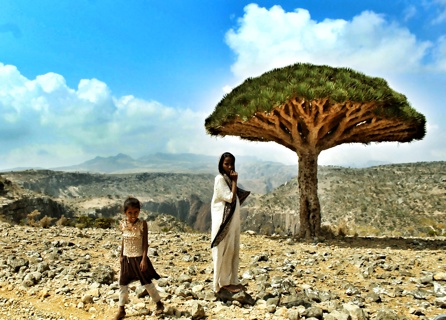
Flight Athens - Abu Dhabi with Turkish Airlines via Istanbul with departure time 21:05 and arrival 06:45 the next morning (not included in the price of the semi guide).
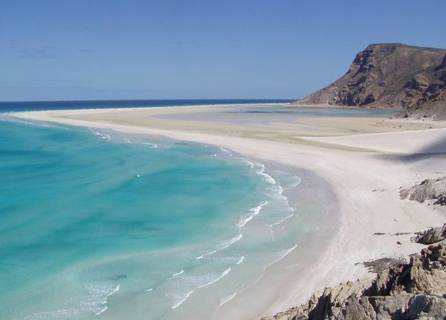
Staying at the airport until the time of our flight to Socotra. Start semi guide program Flight to Socotra leaves at approximately 11:30 and arrives at 13:00. Lunch and departure for Ayhaft Canyon National Park, where among other things we will spend time with local villagers visiting their humble homes, drinking tea and interacting with them. Later departure for the northwestern tip of Socotra and the Detwah wetland.
Detwah Lagoon is a coastal lagoon which is famous for its impressive scenery but mainly for the rich fauna it hosts, which led to it being designated as a Ramsar wetland of international importance and designated as a UNESCO World Heritage Site. It has a tidal entrance open to the sea and is surrounded by sand dunes and limestone and granite cliffs 400 meters high. It is considered an important nesting and feeding area for waterfowl, with 32 species recorded here, including the endangered Egyptian vulture and the vulnerable cormorant Socotra Phalacrocorax nigrogularis.
Dinner and overnight stay in tent campsites.
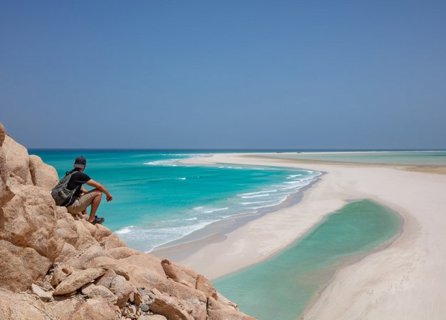
Today will be entirely dedicated to getting to know the region.
First we will go to the beautiful fishing village of Qalansyia, where the charming images of the traditional houses and narrow alleys, are complemented by images of fishing boats, the catches of fishermen and children playing. From here we will depart by boat for Shuaab beach, sailing steep shores in a sea that is usually calm since it looks west that rarely blows. It is very likely to encounter groups of Long-tailed Cross Dolphins, Famous for their acrobatic performance with aerial rotary jumps, to follow our boat. Arriving at the beach we will go out to explore, walking on the white fine sand or on the slopes of mangroves that surround it. Here we can also swim in the crystal clear waters that have an average temperature of 24o C.
Returning to the camp we will dedicate the afternoon to marches along the lagoon and maybe we can visit Ellai who lives in a cave like the ancient inhabitants of the island, fishing in the lake by hand, or take a course to the top above the lake enjoying the amazing view from above.
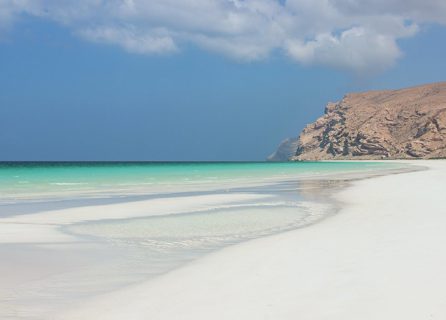
After breakfast we depart for the Dixsam plateau, known for its endemic Dragon Blood trees, one of the two areas of Socotra that exist in such high concentrations. The resin of these trees is blood-red in color (which determined their name), has immunostimulating properties and is collected by the inhabitants of Socotra for use and trade. Their branches are spongy, fibrous and brittle and are now seriously threatened after goats enter the island, since they eat the young trees before they can grow, when they are still in the form of a tender bush. On the plateau there are gorges, caves and caves inhabited by Bedouins, some of which we will explore.
At the Shebahon viewpoint we see a magnificent view towards the Dirhur Gorge with its unusual rock formations. We will drive down to the bottom of the gorge for lunch and an easy walk and maybe swim in the freshwater pools we will meet here. Dinner and overnight with tents in Fermhin Forest, a Dragon Blood tree forest, Bottle Tree and others.
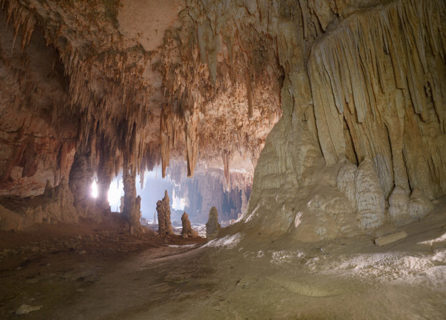
We travel to the south of the island, with visits to villages along the way. Our first destination is Amaq beach where we can swim in the clear waters of the Indian Ocean. For lunch we will go to Dagub cave, which overlooks scattered traditional villages below. The cave itself is interesting as there are many stalactites, stalagmites and small pools of water that have formed on the rock over time.
Then we will wander through the colossal dunes of Hayf and Zahek that are constantly shifted by the seasonal winds of Socotra. Dinner and overnight with tents at Amaq Beach or Zahek Dunes.
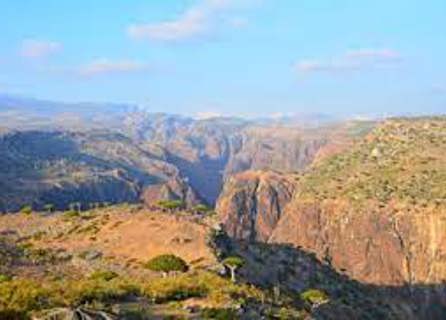
After breakfast we depart for the northeast side of the island and Difarhu gorge where we can see traditional villages and natural water pools at the bottom of the gorge. The unusual endemic tree Socotran Desert Rose clings in many places to the canyon walls, another tree species that exists only in Socotra.
After lunch we drive to the marine protected area of Dihamri which is home to one of the richest coral reefs of the archipelago. There are many marine animals that can be seen by snorkeling or scuba diving, such as: parrotfish, eel, ray, multifarious sea urchins, etc. Diving equipment is available for rent in the area
We only remind you that the area is protected and we should not touch corals, as this would cause irreversible damage.
Here we can swim, snorkel, or just hiking in the surrounding area. Those interested can do bottle diving here and the support of the local diving center (extra charge).
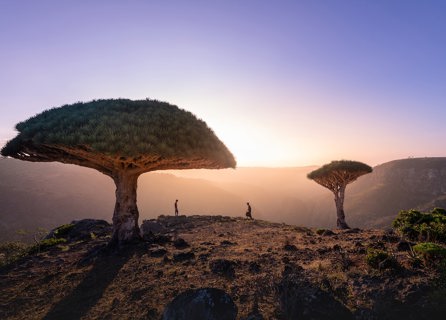
Departure for Kalesan Gorge, stopping at Qaria lagoon, the largest on the island, frequented by herons, flamingos and other wading birds.
Arriving at the gorge we will make a hike and then depart for the Homhil plateau, a spot with a large concentration of Dragon Blood trees (Dracaena cinnabari), frankincense and others. On this plateau there is also a natural pool fed by various small streams and here we can swim while enjoying the magnificent view of the Arabian Sea.
Overnight in tents on the Homhil plateau
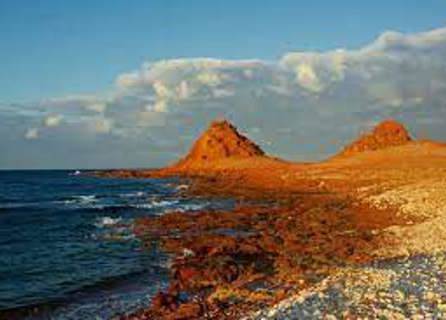
We start early and drive to the village of Terbak, at the base of Hoq cave. From a path we ascend to the cave, a route that takes 1 1/2 hours. The cave itself is over 3 km long and is one of the largest and certainly the most famous in Socotra. It has large halls filled with stalactites, stalagmites and other crystalline formations, while it also hides an archaeological past, since ceramic fragments and wooden tablets with Aramaic inscriptions dating back to the 3rd century AD were found. A.D. when Christians lived on the island. Exploring the interior requires lenses and takes 40 minutes to reach the water pool at its bottom. Returning we will go to Arher beach, a long beautiful beach with white sand and the highest sand dunes on the island, in which we will spend the night in tents.
In the afternoon we will take a walk to the most eastern point of the island, Cape Ras Erisel, the point where the Arabian Sea meets the Indian Ocean.
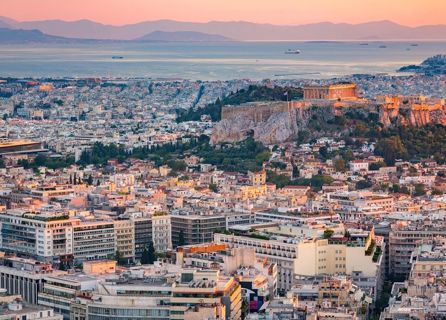
After breakfast we depart for the airport, for our lunch flight to Abu Dhabi. End of semi guided program
Transfer to a hotel to rest until midnight when we will be transferred to the airport
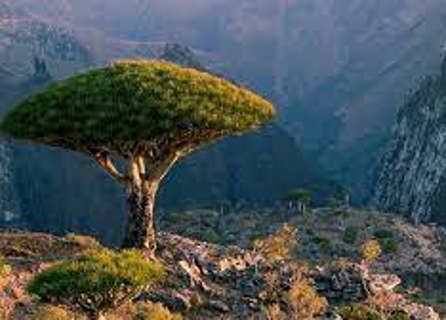
Midnight flight to Athens via Istanbul, departure time 02:50 and arrival time 10:00.
2.760 € / person for 2-4 persons
2.630 € / person for 5+ persons
3.330 € / person for 1 person
4.010 € / person for a group of 10+ persons (Christmas 2024)
Note 1: The issuance of airline tickets is subject to availability and prices in effect at the time of issuance. Early planning is required to secure seats
Note 2: To be part of the group departure with a Greek escort at Christmas 2024, you must book your trip at least by the end of June. The price quoted for groups is indicative and will be finalized after booking air tickets and possible hotels in between flights.
To reserve a seat, you must first read the booking conditions and, if you accept them, then fill in the PARTICIPATION FORM.
After completing the Registration Form and within 10 days you will have to send a deposit of 1,000. The payment of the trip must be completed gradually up to one month before departure. Air tickets, in case their issuance is undertaken by our office, must be prepaid. Any cancellation of air tickets is subject to the conditions and restrictions of each airline and is not covered by the cancellation terms of the rest of the package.
The deposit and the payment should be sent to the account of ALPHA BANK with IBAN number: GR1001407960796002002013550, under the name OUTDOORS TRAINING IKE.
During the money transfer or deposit process, write down your name and the name of the trip in the REASON field.
Travel, accommodation, meals
Air tickets Abu Dhabi - Socotra are included in the price, however, there is no possibility to reserve seats without immediate ticket issuance.
Local travel is by Land Cruiser or other similar car with a maximum of 4 cars per vehicle, as large parts of the route are rough dirt roads.
Accommodation in the camps is in tents in an organised area with built-in toilets. Each tent has a mattress, pillow and sheet, and everyone takes their own personal sleeping bag. There are no showers available at the camps and for this reason we will often stop for a swim in natural freshwater pools or in the sea, where the water temperature is about 24o C
Meals include 3 meals per day which are prepared by our local staff. They cook for us in places of unparalleled natural beauty (canyons, beaches, mountains, etc.) and serve in the shade of lianas or dragon trees. Lunch is usually taken snacked on the way, while for dinner we usually take it more comfortably with folding chairs and tables.
Charging batteries
It is possible to charge camera or mobile batteries in cars. Take the right car power supply with you.
Climate
The climate of the island is desert and semi-desert, with temperatures ranging from 20o C to 35 o C. Climatically it is divided into three categories the coastal plains, the limestone plateau with gorges, caves and karst caves and the Haggier massif. The rainiest months are May and September to December (with low rainfall heights however) and humidity ranges from 60% to 70%, while in the summer months it is windy. The best time to travel to Socotra is the months from October to May, with best months in March and April.
Insurance / insurance
In the cost of the trip we have included Basic travel insurance, which protects us both from unexpected situations that may be related to covid-19, as well as other health contingencies (eg injury on a course that requires transportation and hospitalization), missed flight and other cases, even coverage of total cancellation of the trip for an amount up to 5.000 € for one of the covered coverages.
Follow the link below to see the coverage of the program. Travel Insurance by Trekking Hellas - Travel Insurance (addvalue.gr)
Note 1: The semi guide programmes include only a local guide. Prices are valid until the end of the spring season, at the beginning of the autumn season they may change.
Note 2: Passports with a minimum validity of 6 months after completion of the trip are required for entry visas, and the passport must not have an entry stamp into Israel
Price from €2630
DECLARE INTEREST